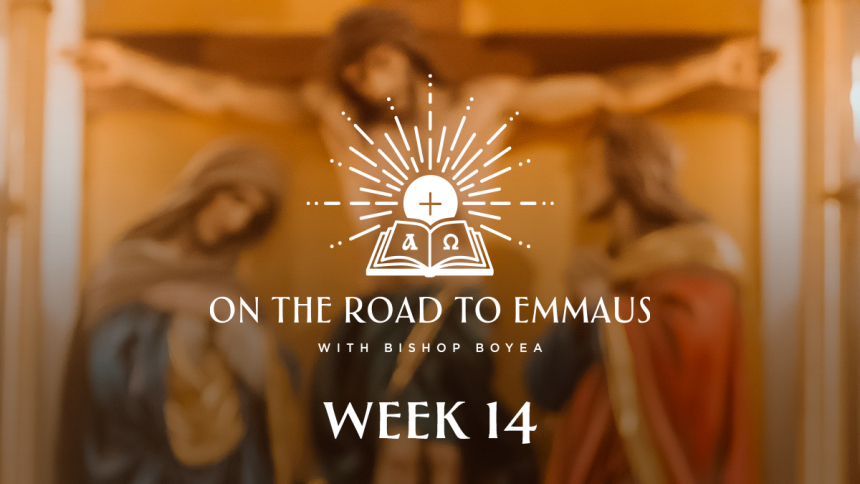
Friday, September 15, 2023
Feast of Our Lady of Sorrows
Dear Sisters and Brothers in Christ,
Since the dawn of humanity, all people of all races and in all places have pondered the eternal verities. Why are we here? What is the purpose of life? Is there a God? Can I know him? Does he know me?
This is why the Catechism of the Catholic Church states: “Man is by nature and vocation a religious being.” That is, to be human is to search for God. It’s unavoidable. It’s part of the human condition.
What is so incredible about the claim of the Christian religion is the degree to which it asserts that our search for God is vastly outstripped by God’s search for us. Let me explain.
Christianity posits that God has revealed himself to us through reason, including the harmony of the cosmos, and through revelation from the Almighty’s covenant with Abraham down through the expectant prognostications of the prophets from Moses to John the Baptist.
And then? Wait for it. Christianity further proposes that this transcendent God finally broke through into time and space in the person of Jesus Christ who is truly God and truly human and who remains with us to this day in His Holy Church including her seven sacraments, the preeminent of which is the Holy Eucharist. Wow! It would almost be hard to believe if it weren’t so utterly, obviously and wonderfully true. What a love story. Thanks be to God.
As Saint Augustine of Hippo says in his Confessions, man is made to live in communion with God in whom he finds happiness. He states: "When I am completely united to you, there will be no more sorrow or trials; entirely full of you, my life will be complete".
That’s why since, at least, the 11th century, Christians have traditionally paused at high point of the day to meditate with gratitude upon the high point of human history: The incarnation of Jesus in the womb of Mary as announced by the Angel Gabriel.
The prayer is known as the Angelus. That name comes from the Latin for Angel and reflects the first line of the text: Angelus Domini nuntiavit Mariæ or, in English, "the Angel of the Lord declared unto Mary.
The prayer then unfolds in a series of three Scriptural calls and responses – what we’d call an antiphonal prayer – alternating each time with the Hail Mary. Rather than explain it further, let’s just pray the Angelus together:
In the name of the Father, and of the Son, and of the Holy Spirit. Amen.
℣. The Angel of the LORD declared unto Mary,
℟. And she conceived of the Holy Spirit.
Hail Mary, full of grace; the LORD is with thee: blessed art thou amongst women, and blessed is the Fruit of thy womb, Jesus. Holy Mary, Mother of God, pray for us sinners, now and at the hour of our death.
℣. Behold the handmaid of the LORD.
℟. Be it done unto me according to thy word.
Hail Mary, full of grace; the LORD is with thee: blessed art thou amongst women, and blessed is the Fruit of thy womb, Jesus. Holy Mary, Mother of God, pray for us sinners, now and at the hour of our death.
℣. And the Word was made flesh.
℟. And dwelt among us.
Hail Mary, full of grace; the LORD is with thee: blessed art thou amongst women, and blessed is the Fruit of thy womb, Jesus. Holy Mary, Mother of God, pray for us sinners, now and at the hour of our death.
℣. Pray for us, O Holy Mother of God.
℟. That we may be made worthy of the promises of Christ.
Let us pray, Pour forth, we beseech Thee, O LORD, Thy grace into our hearts; that, we, to whom the Incarnation of Christ, Thy Son, was made known by the message of an angel, may by His Passion and Cross be brought to the glory of His Resurrection. Through the same Christ our Lord. Amen.
And that is my challenge for this week: Pray the Angelus at midday every day and genuflect at the words "and the Word was made flesh".
What difference will it make to your life and how will it help you to better pray the Mass? Watch this short film featuring Sister Louise Marie O.P. who is a young Dominican Sister of Mary Mother of the Eucharist based in Ann Arbor. The Dominican sisters pray the Angelus three times a day. Why? Click below to watch and find out. Enjoy!
Assuring you of my prayers, I am sincerely yours in Christ,
+ Earl Boyea
Bishop of Lansing
